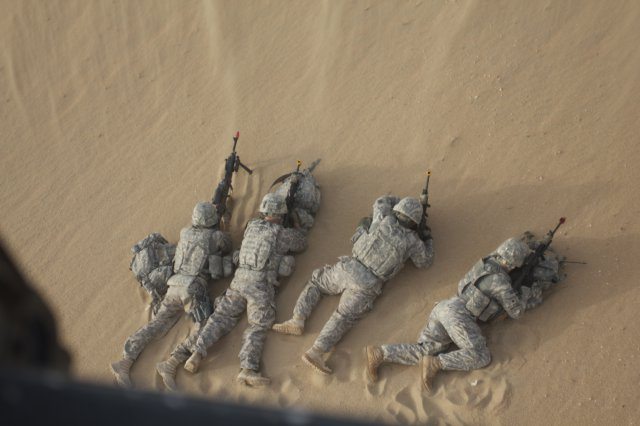Though they performed unit-level tasks in the exercises, the companies’ ultimate success was due to the most basic Soldier skills of all — leadership and discipline.
Faced with role players shouting criminal accusations and other insults, the troops of 4th Battalion, 118th Infantry Regiment maintained their game faces during separate exercises at Range 5 in late May. Dubbed Operation Desert Defense, the exercises were designed to test the troops’ ability to air-assault into an area, move to the embassy, defend it and set up conditions to evacuate it.
“Our Soldiers never overreacted,” said Lt. Col. Frederick Pasley, the 4th Battalion commander. “They used good use-of-force techniques and had good restraint.”
Company A performed the exercise May 27-28, and Company C performed it May 30-31. In addition to manning the embassy defenses for about 24 hours, the companies coordinated the medical evacuation of simulated wounded and re-supply by helicopter, and their movement back to Camp Buehring by the 4th Battalion’s 1118th Forward Support Company, according to 4th Battalion Operations Officer Capt. Michelle Roberts, of Spartanburg, S.C.
“There were a lot of moving pieces,” Roberts said.
Like Company A two days before, Company C air-assaulted to an area near Range 5 around 5:30 a.m., linked up with Soldiers who were acting as embassy personnel and moved tactically to the buildings, enclosed by tall sand berms, which served as embassy compounds for the exercise.
Slogging across the soft desert sand, the troops encountered a group of their fellow 4th Battalion Soldiers — decked out in civilian clothing and head scarves — playing the part of host-nation civilians for the scenario. Though they cheered the troops, the role players became too friendly, enthusiastically crowding around the Soldiers and blocking their route to the embassies.
The troops then moved in and set up their defenses, to include preparing range cards. For the Soldiers, this meant lying prone behind their weapons on the sand berms.
Then the sun climbed higher, the temperature rose above 115 degrees and the exercise began in earnest as the role players formed mobs, continually pounded on the wire-mesh embassy gates and shouted demands for food, water and medicine. The role players also tossed small stones into the embassy grounds and tried unsuccessfully to infiltrate the defenses.
This is the kind of real-world situation which could inhibit the mission, explained Capt. Hindman, Company C commander, from Charleston, S.C.
“It makes the leaders at every level have to react and make decisions,” he said of the scenario. This includes the team leaders and “anybody who has ‘leader’ in their title,” he added.
The role players’ mission was to elicit an emotional response from the troops, but the troops’ job is to react as Soldiers, Hindman explained. Though the role players performed their mission well, the Soldiers kept their composure, he recalled.
The mob left and returned several times throughout the morning, eventually accusing the Soldiers of making illegal arrests and committing a homicide. Despite the shouts and clanging sound of the role players pounding on the gates, the Soldiers calmly and quietly manned their posts, and seemed to speak only to pass their tactical observations onto their team and squad leaders.
Planning, preparation and rehearsals at the unit level, especially the evacuation part of the mission, ensured the exercises’ success, said Pasley, of Charleston, S.C. The units briefed the Soldiers about the possibility of a hostile crowd, and the standards on the use of force were “embedded into every soldier,” he stressed.
“It requires a lot of discipline from (the Soldiers) and their leaders to make sure we don’t get sucked into a situation,” Hindman said.
Sgt. 1st Class Eric Gallman, a Company C platoon sergeant who was acting as platoon leader for the exercise, said the troops “showed great restraint when being provoked by the role players.”
“As infantrymen, it’s natural for us to aggressive,” said Gallman of Spartanburg, S.C. “This was a passive situation. This was a training challenge.”
A unit’s composure under pressure depends on how well the Soldiers know each other, including how each Soldier reacts to different stresses, Hindman said. Continuing exercises like this are a valuable part of building that cohesion, he added.
“It’s kind of like building muscle,” he said. “If you lift the same weight, you never get stronger. It’s only by pushing yourself that you get stronger.”
The 4th Battalion went to the National Training Center, known as NTC, at Fort Irwin, Calif., in October of 2011, and his platoon has been building the muscles of cohesion since they came together under new leadership there, Gallman said. The training at NTC was a heavy lift that set them up for success, and the lessons learned there defined everybody’s role, he added.
Company C’s noncommissioned officers “did a phenomenal job” during Operation Desert Defense, Hindman said. Along with understanding and adhering to the mission intent and end state, the noncommissioned officers took care of the troops, ensuring they kept their cool despite the role players and desert heat, he stressed.
“It was black flag, 120 degrees,” Hindman said, referring to the heat category at times during the exercise. “We had no heat casualties.”
They’re blessed with good leaders, Gallman said.
“They make good things happen,” he said. “It’s the team leaders and squad leaders who ensure success.”








